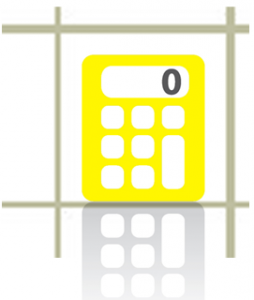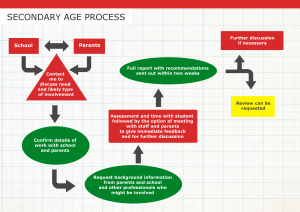 At the point of requesting input from the Educational Psychologist, there may well be some history of support, and information about this and the child’s response is useful. Background information will be requested from both school and home and from any other profesionals who have been involved with the child, in order to set the assessment within the context of the pupil’s world and their experience to date.
At the point of requesting input from the Educational Psychologist, there may well be some history of support, and information about this and the child’s response is useful. Background information will be requested from both school and home and from any other profesionals who have been involved with the child, in order to set the assessment within the context of the pupil’s world and their experience to date.
The focus of the assessment will vary according to the concerns raised by both parents and school, at the point of referral.
During this secondary schooling period, it is important to observe how the child applies themselves to different tasks both within a 1:1 session and also in a class context. Standardised tests are given, which will establish the child’s particular set of current cognitive and learning strengths and weaknesses along with their current levels of attainment in different curriculum areas. Also very important are the pupil’s views about their learning, their motivation, their self perception and confidence. Establishing these is an important part of the assessment.
The results and hypotheses of the assessment will then guide how teachers and parents can support the individual student within school and at home with their learning, organisation and with addressing any specific needs highlighted by the assessment. It will also focus on how the individual can develop their metacognition ie. their consciousness of what they do for effective learning.
Specifically, assessment with the secondary aged child includes focussing on:
- Health, including vision and hearing
- Reasoning with language, use of language, phonological awareness
- Perceptual reasoning
- Processing speeds
- Working memory, auditory memory, visual memory
- Levels of attainments in literacy and maths
- Eligibility for specific access arrangements for public, such as extra time, spell checker etc according to the regulations of the particular examinations’ body for the public examinations.
- Sensory Processing
- Attention and other learning behaviours
- Social behaviour
- Curiosity levels, the student’s interests
- Emotional awareness: understanding of emotions, different social situations, theory of mind
- Gross and fine motor skills
- The student’s own views about their learning and their life
Living in the digital age where young people can be considered to be ‘digital natives’, an important part of the assessment is understanding how the student currently uses technology and considering how technology can support their learning process. In particular is how technology can support the learning strengths, and help develop or over ride the weaknesses. At the same time, there is also the ‘management’ and ‘good IT habits’ to focus upon, particularly important with regards to social networking, connectivity with e-mail, texting etc.
Considering particular types of profiles is also part of an assessment and this can lead, if viewed as helpful to specific diagnoses such as Dyslexia, Dyscalculia, Non Verbal Learning Disorder, Dyspraxia, ADHD, Asperger’s Syndrome, Sensory Processing Disorder. [1][2]
To view a diagram of the Secondary Age Process please click on the image below.
[1] If there is a significant likelihood of a diagnosis of dyspraxia or sensory processing disorder, a referral to the Occupational Therapist is appropriate
[2] A multi-disciplinary assessment will be recommended if there is a high probability of ADHD or Asperger’s Syndrome, which will usually include a Speech and Language Therapist, a Clinical Psychologist and an Occupational Therapist

